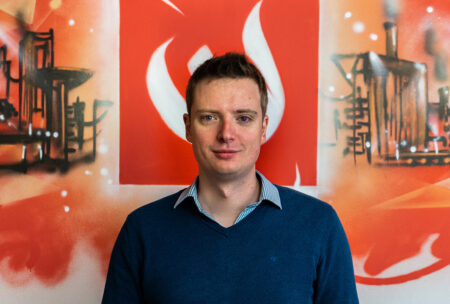The on-going digital transformation of manufacturing with a strong focus on automation and data use, often called industry 4.0, is essentially about optimising industrial performance and creating smart factories. This is where Wizata comes in. “Engineers are constantly taking very complex decisions about how to use the assets of their plants in the best way possible in order to reduce costs and energy consumption and to be efficient and sustainable,” explains co-founder and CEO Jean-Philippe Hugo. “We help them optimise their decisions by data observations done using new technologies such as the internet of things, artificial intelligence, machine learning and digital twins.”
Finding the truth in data
A software engineer by training, Mr Hugo started his professional career as a technology integration consultant but wanted to go further in the field of data analytics and “find the truth in data” through solutions for the manufacturing industry. Together with two colleagues, the Belgian entrepreneur set up Wizata in Luxembourg in 2014.
 The team started to undertake projects for industrial companies including steel giant ArcelorMittal in order to understand what offering was missing on the market and what they could do to fill the gap. The result was the development of a digital platform that industrial companies can plug into their own systems in order to connect, manage and organise data flows stemming from their machines, production lines and facilities in one single place. The information obtained can be used for smart monitoring, industrial automation, preventive maintenance, anomaly detection, and so on.
The team started to undertake projects for industrial companies including steel giant ArcelorMittal in order to understand what offering was missing on the market and what they could do to fill the gap. The result was the development of a digital platform that industrial companies can plug into their own systems in order to connect, manage and organise data flows stemming from their machines, production lines and facilities in one single place. The information obtained can be used for smart monitoring, industrial automation, preventive maintenance, anomaly detection, and so on.
The way to growth
In 2018, the company raised funds from Luxembourg’s public-private Digital Tech Fund. “This helped us develop our product,” says Mr Hugo. “The following year, we were able to release the first version at the Hannover Messe, where we participated on the Luxembourg stand for start-ups organised by the Chamber of Commerce.”
Luxembourg also attracts top-level talent that makes it possible to build globally competitive teams.
Today, the company has a staff of 20 and sells its platform as a service to large international groups as well as smaller manufacturing companies active in fields such as metals, mining, oil, energy, chemicals, paper production, building materials, and food and beverage. “We have deals in Brazil and Canada and soon also in Asia, but we still also work with ArcelorMittal and have a lot of interactions with its headquarters here in Luxembourg.”
A place of trust
Wizata thrives in the Luxembourg environment. “The country is really supportive and invests both in its start-up ecosystem and in innovation,” Mr Hugo comments. “The size means that it is much easier to get in direct contact with decision makers at public institutions than it would be in a larger country. With its international environment, Luxembourg also attracts top-level talent that makes it possible to build globally competitive teams. Our employees come from 13 different nationalities.”
Our customers feel reassured by the trustworthy image we have as a Luxembourg-based company.
Luxembourg has a strong industrial past and was once one of the world’s biggest steel producers. “The country still has an excellent reputation in the field of advanced engineering which we can benefit from,” says Mr Hugo. “On top of that, it conveys an image of trust. When taking the decision to entrust us with access to their data and machinery, our customers feel reassured by the trustworthy image we have as a Luxembourg-based company.”

